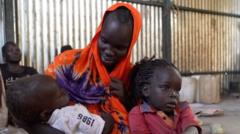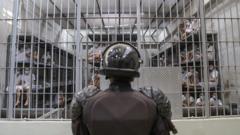Over 19,500 Afghans have been deported from Pakistan this month, with more than 80,000 expected to leave by a new deadline imposed by authorities. As tensions rise, many of those returning are faced with grim prospects, having lived in Pakistan their entire lives. Amid border disputes and humanitarian concerns, the situation intensifies, drawing criticism from human rights advocates and national security officials alike.
Pakistan's Massive Deportation of Afghans Raises Security and Humanitarian Concerns

Pakistan's Massive Deportation of Afghans Raises Security and Humanitarian Concerns
A spike in Afghan deportations from Pakistan has lambasted communities and aid groups, as 19,500 Afghans have already been sent back this month amid ongoing tensions.
Pakistan has expedited the deportation of Afghans this month, sending back over 19,500 individuals among an anticipated 80,000 by a newly enforced deadline, according to the United Nations. The country is primarily focusing on expelling undocumented Afghans and those with temporary residency, claiming it can no longer manage the influx. Reports indicate that between 700 and 800 families are facing deportation daily, with up to two million anticipated to follow shortly.
The recent influx of Afghans into Pakistan has been a long-standing issue since decades of conflict, yet the Pakistani government cites national security concerns and strains on public services as reasons for the urgent expulsion. Foreign Minister Ishaq Dar's recent visit to Kabul emphasized discussions with Taliban officials, who expressed "deep concern" about the situation.
Decades of refugees now face the possibility of returning to a region they do not know. Many deportees, like Sayed Rahman, a second-generation Afghan born in Pakistan, voice confusion and despair about being sent to a homeland they’ve never lived in. Others, like Saleh, worry about the future of their children, especially girls who risk losing educational opportunities under Taliban governance.
At the Torkham border crossing, deportees describe their harrowing return amidst a backdrop of rising tensions. Families struggle in temporary shelters where resources are scarce; some elderly individuals require medical assistance just to cross the border. The returnees receive limited financial aid from the Taliban authorities, further complicating their transition back into a fraught environment marked by an economy that is already in crisis.
Pakistani authorities acknowledge the difficulties but assert they do not impede the transfer of personal belongings for returning refugees—a point met with skepticism by those who faced restrictions. The situation continues to evolve as humanitarian and security implications deepen, placing additional strain on the already fragile infrastructure in Afghanistan, exacerbated by the return of deportees.
As the conflict escalates, discussions between Pakistan and Afghanistan grow more critical; however, hope appears limited for the displaced families lost in a system that offers scant emotional and logistical support. While authorities emphasize their duty to uphold national security, the voices of those caught in the crosshairs call for compassion amid their uncertain journeys ahead.
The recent influx of Afghans into Pakistan has been a long-standing issue since decades of conflict, yet the Pakistani government cites national security concerns and strains on public services as reasons for the urgent expulsion. Foreign Minister Ishaq Dar's recent visit to Kabul emphasized discussions with Taliban officials, who expressed "deep concern" about the situation.
Decades of refugees now face the possibility of returning to a region they do not know. Many deportees, like Sayed Rahman, a second-generation Afghan born in Pakistan, voice confusion and despair about being sent to a homeland they’ve never lived in. Others, like Saleh, worry about the future of their children, especially girls who risk losing educational opportunities under Taliban governance.
At the Torkham border crossing, deportees describe their harrowing return amidst a backdrop of rising tensions. Families struggle in temporary shelters where resources are scarce; some elderly individuals require medical assistance just to cross the border. The returnees receive limited financial aid from the Taliban authorities, further complicating their transition back into a fraught environment marked by an economy that is already in crisis.
Pakistani authorities acknowledge the difficulties but assert they do not impede the transfer of personal belongings for returning refugees—a point met with skepticism by those who faced restrictions. The situation continues to evolve as humanitarian and security implications deepen, placing additional strain on the already fragile infrastructure in Afghanistan, exacerbated by the return of deportees.
As the conflict escalates, discussions between Pakistan and Afghanistan grow more critical; however, hope appears limited for the displaced families lost in a system that offers scant emotional and logistical support. While authorities emphasize their duty to uphold national security, the voices of those caught in the crosshairs call for compassion amid their uncertain journeys ahead.



















